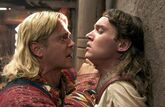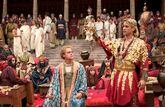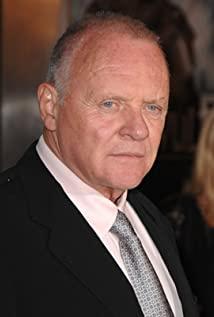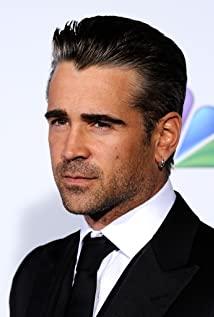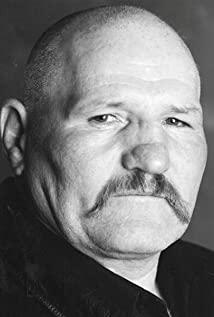Macedon). Philip II's succession process was very tortuous. His father was King Amyntas III of Macedon, his mother was Eurydice II, and Philip II was the youngest of three sons. After the death of Amyntas III, he was succeeded by his eldest son, Alexander II, who was assassinated within three years of his succession, and succeeded by his second son, Perdiccas III; He died in battle in 2000, and was succeeded by his son Amyntas IV. Philip II immediately seized the throne of his nephew and became king of Macedonia (359 BC). In the second year of Philip II's accession to the throne, Morothia of Epirus became an ally of Macedonia, and Philip II married Olympias, the daughter of the king of Morossia. In 356 BC, Olympias' son, Alexander, was born; a daughter, Cleopatra, was later born. Philip II had many wives, of which Olympias was the more important one. But in 337 BC, Philip II married Cleopatra (later renamed Eurydice), the niece of the Macedonian nobleman Attalus. Eurydice is probably equivalent to Elizabeth in modern Europe, a traditional noble female names). Attalus declared at the wedding feast that Philip II would have a legitimate heir, implying that Alexander was an illegitimate son (ie, refusing to recognize the legality of Philip II's marriage to Olympias). Alexander was so angry that he clashed with Philip II and returned to Epirus with his mother, Olympias, and then to Illyria. Accompanying him to leave Macedonia were his childhood companions and good friends, Ptolemy, Cassander and others. But the next year, in 336 BC, Philip II recalled Alexander. At this time, the new queen Eurydice had given birth to the young prince Kranos, and the youngest daughter Europa. That year, Philip II decided to marry Olympias' daughter, Cleopatra, to King Alexander I of Morossia. Alexander I was Olympias' younger brother, so Cleopatra was actually married to her own uncle. At Cleopatra's wedding, Philip II was assassinated by his bodyguard Pausanias. Some people think that Olympias participated in the planning of the assassination, but Alexander immediately blamed the Persian king Darius III. Historians believe that both mother and son may have been the masterminds. Olympias then executed Eurydice and her two children. It is also said that the little prince Kranos was executed by Alexander's order, while Eurydice and Europa were killed by Olympias. The wives and children of Philip II. Audat, Princess of Illyria a, had a daughter Cynane; Cynane's daughter, Eurydice III, was the wife of Philip III. Kunane and Philip III were siblings, so Eurydice III was also married to an uncle. Fila I, the daughter of a Macedonian nobleman, may be the second wife of Philip II, with children whose names are unknown. Nicosiapolis of Philae, third wife, had a daughter Thessalonica; Thessalonica was the wife of Cassander, a friend of Alexander. Olympias, Princess of Morossia, had son Alexander and daughter Cleopatra. Philinna of Larissa, who was not of high birth, was probably a dancer. He had a son, Achthaeus (Philip III, born about 359 BC). Philip III was mentally retarded, and some believe that Olympias poisoned him, but there is no evidence to prove this. Alexander the Great often took him with him on his expeditions. Meda of Odessa, daughter of the Thracian king Cothelas, and possibly the sixth wife of Philip II. Cleopatra Eurydice, the daughter of a Macedonian noble, had son Kranos and daughter Europa. When he was young, Philip II hired the Greek philosopher Aristotle as a tutor for Alexander (Aristotle's father was Philip II's physician). His companions were Ptolemaic (Ptolemaic I of Egypt), Cassander (founder of the Antipater dynasty of Macedonia), Seleucid (king of the Seleucid dynasty, "Victorious" "Seleucus I, the ancient Chinese name [Tiaozhi]), Hephaestion, etc. Ptolemy, Ptolemy I of the Ptolemaic Dynasty of Egypt, possibly the son of Philip II. Ptolemy's father, Lagus, married Arsinois, a concubine of Philip II, who was born in 367 BC (Philip II was 16 years old). Macedonian officials later included Arsinoi in the royal family tree. Ptolemy married Eurydice, daughter of Philip II's general Antiochus, for an unknown time. She had three sons with Ptolemy, Ptolemy Cronos, Meleagerus, and an unknown son who was later named by half Ptolemy II was executed. Eurydice also had two daughters, Ptolemais, who married Demetrius I of the Antigonian dynasty, and Lysandera, who later married Agathocles, son of Lysimachus; Eurydice's handmaiden Berenice I was the daughter of the Greek nobleman Magas. After the birth of Leniki and Ptolemy's child, Eurydice left Egypt, and Berenice gained the exclusive favor of the king. Berenice's son Ptolemy II replaced Eurydice's son as Ptolemy I's heir. Bereniki's daughter was Arsinois II. Ptolemy II was nicknamed "the man in love with his sister" because of his marriage to Arsinoe; after Alexander's death, Ptolemy was given Egypt as governor of Egypt. In 306 BC, he was crowned Pharaoh of Egypt and called Ptolemy I. The Ptolemaic Dynasty begins; the last monarchs of the Ptolemaic Dynasty were Queen Cleopatra VII and her son Ptolemy XV Caesar the Younger. Cassander, son of Philip II's general Antipater. After Alexander's death, his mentally retarded older brother Philip III became king of Macedonia, with Antipater as regent; Cassander's younger brother, Iolas, was executed by Alexander's mother, Olympias (suspected of poisoning Alexander); Cassander then executed Olympias; Cassander married Alexander's half-sister, Thessalonica, and had three sons: Philip IV the eldest, Antipater II the second, and Alexander V the third ; Cassander died of edema in 297 BC; eldest son Philip IV was enthroned as king of Macedon (the Antipater dynasty began), but died soon after, and Macedonia was thus divided into two parts: eastern by Antipater Ruled, the west was ruled by Alexander; second son Antipater murdered his mother because his mother Thessalonica doted on his youngest son Alexander; youngest son Alexander drove Antipater away in revenge for his mother, and was subsequently killed by Antiochus I's son Demeter Killed by Li I; Alexander V married an unknown daughter of the Egyptian pharaoh Ptolemy I; Antipater was killed and usurped by his cousin Sosthenes a few months after he became king of Macedonia, Antipater The Pat dynasty ended. (Two years after Sosthenes ascended the throne, he was killed by Demetrius' son Antigonus II.) Antigonus, Antigonus I of the Antigonus dynasty of Macedonia. Died in 301 BC. His son Dmitri I ruled Macedonia with his father since 306 BC. Demetrius I was later imprisoned by Seleucus I; Demetrius I married Ptolemy I, daughter of Ptolemy I and Eurydice; married daughter Stratonic to Seleucus I (second wife), had a son and a daughter; Stratonico's mother may have been Cassander's sister Fila; after Seleucus' death, Stratonicole married Seleucus's The eldest son, Antiochus I, gave birth to five children; the last king of the Antiochus dynasty was Perseus; 146 BC, Macedon fell , which became the Macedonian province of the Roman Empire. Seleucus, Seleucus I of the Seleucid Empire. The date of birth is unknown, but it should be about the same age as Alexander the Great; in 324 BC, he married Apama, the daughter of a Bactrian nobleman; Apama gave birth to his eldest son, Antiochus I, with daughters Laudis and Apama ; After the death of Appama, Seleucus married Demetrius I's daughter, Stratonico; Historians believe that he was an excellent diplomat and logistics officer, who ensured the logistics supply of the army during Alexander's expedition and commanded an army of guards; Hephaestus at the mass wedding of Susa in Persia in 324 BC. Ann married Drypteis, the youngest daughter of King Darius III of Persia; in the autumn of the same year, he died of illness in Ecbatana (now Hamadan, Iran), the cause of death is unknown, and the time from onset to death was very short. Short, with symptoms similar to typhoid fever, it caused stomach ulcers that led to internal bleeding and death. But some people speculate that he was poisoned, and the mastermind was Alexander's wife Roxana; others believe that it was the hands of other generals. After Hephaistion's death, his body was cremated and his ashes were brought back to Babylon. Alexander the Great died in Babylon on June 10, 323 BC. The cause of his death has been the subject of various speculations, Poison said: One theory is that the poison was provided by Aristotle, Alexander's mentor (Aristotle died in 322 BC, the cause of death is unknown, and there are multiple speculations: death from illness, poisoning , suicide, etc.) - some pharmacists infer from pharmacology that Alexander died of chronic saccharine poisoning; another theory is that Alexander's subordinate generals were dissatisfied with his unstable mood and poisoned the monarch; another theory is that His wife Roxana was dissatisfied with his doting on other wives, and she poisoned her husband out of love and hate; Olympias killed many people here, including Cassander's younger brother Iolas. Virus says: CDC believes 'Alexander died of West Nile virus'. Disease Says: It is thought that he died of liver failure caused by chronic alcoholism. Others believe that both Alexander and Hephaistion were poisoned. Alexander the Great did not designate a successor during his lifetime, which triggered three battles of successors. His half-brother, Akthaeus, became Philip III, and the posthumous son Alexander IV, born to Alexander's first wife Roxana, ruled Macedonia together, but the power was in the hands of the then regent Padika. Alexander's sister Kunane immediately married his daughter Eurydice III to Philip III. male In 317 BC, Olympias executed Philip III and forced Eurydice III to commit suicide. The following year, Cassander became regent of Macedonia, executed Olympias, and imprisoned Alexander IV and Roxana. After the Third War of Successors, Cassander signed a peace treaty recognizing the rights of Alexander IV, who would succeed Cassander as ruler of Macedonia when he came of age. The supporters of the Ajid dynasty then claimed that Alexander IV should be in power immediately without the need for a regent. In 309 BC, Cassander ordered the execution of 13-year-old Alexander IV, officially ending the Ajid dynasty. Roxana, Roshanak in Bactrian, meaning "little star", or "brightness", and Rokhsāna in Persian, meaning "beauty of light", also known as Roxane, is Bactria (called "Daxia" in ancient China, "Tokhārestan" in the West, Daxia is the transliteration of Tochari) was the daughter of the Sogdian nobleman Oxyartes and the first wife of Alexander the Great. Born before 341 BC, the exact time cannot be determined. After Alexander the Great conquered Bactria in 327 BC, he fell in love with Roxana, who was only 15 or 6 years old at the time, and proposed to her, and the bridesmaid was Hephaistion. This marriage improved Macedonian relations with the conquered Sogdians, but it caused dissatisfaction among the Macedonian generals, who believed that the king should marry a Macedonian noblewoman, not a lowly woman from a barbaric eastern nation. (The relationship between Teen Wolf and Jenny Westerling in A Song of Ice and Fire likely draws on Alexander and Roxana.) Roxana followed Alexander through the Indian War. Afterwards, Alexander led the Macedonian army back to Persia and held a five-day mass wedding in Susa. Alexander married Stateira II, daughter of King Darius III of Persia, and Parysatis II, the younger daughter of King Artaxerxes III of Persia. After Alexander's death, Roxana most likely executed the two Persian princesses, Statetra, Parisadis, and Hephaistion's wife, Princess Delibes. Alexander also had an illegitimate son, Heracles, with Barsine, Memnon's wife, Rhode Island. In addition, according to textual research, Alexander was not tall, less than 160 cm. II. After Alexander's death, Roxana most likely executed the two Persian princesses, Statetra, Parisadis, and Hephaistion's wife, Princess Delibes. Alexander also had an illegitimate son, Heracles, with Barsine, Memnon's wife, Rhode Island. In addition, according to textual research, Alexander was not tall, less than 160 cm.
Alexander in blue, Hephaistion in red cape
View more about Alexander reviews



